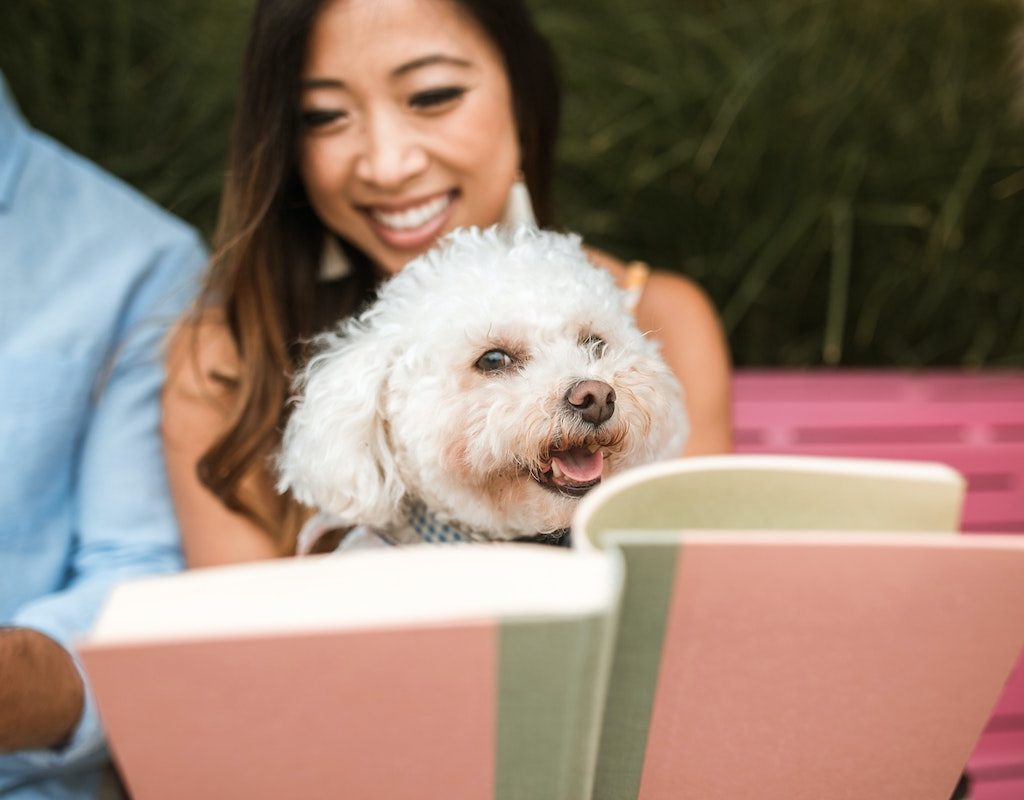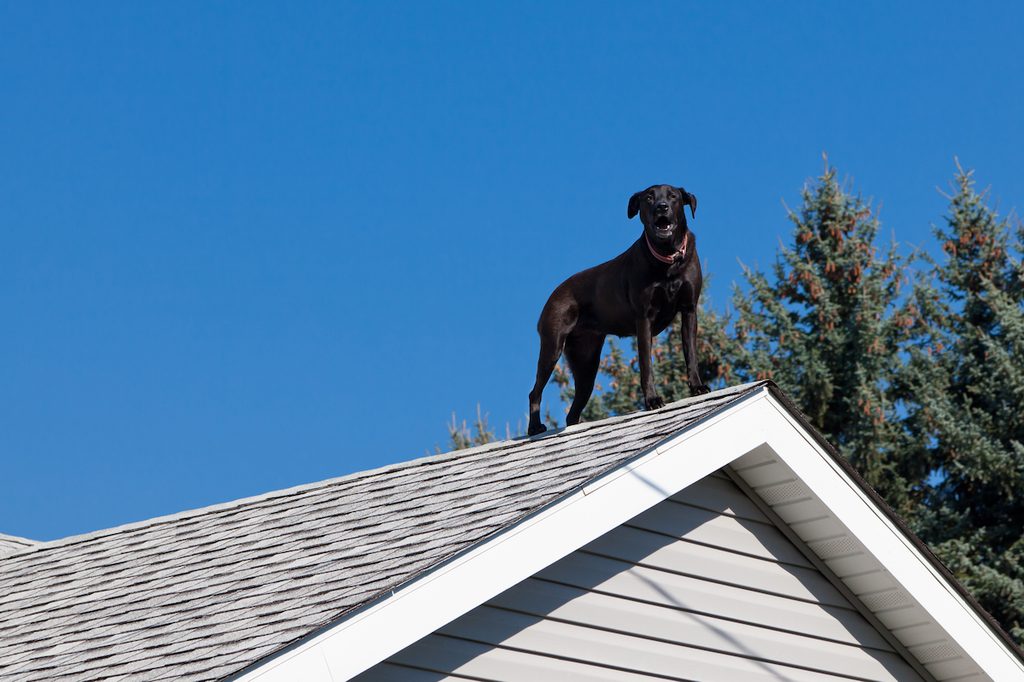
One of the best things about pets is they love us unconditionally: They jump for happiness when we get home, dutifully stand by our side no matter what, and beg for our attention even when we’re in our PJs with unkempt hair. Velcro dogs take this to the next level. These pups stick to their humans like glue, or well, velcro. They can’t get enough of their people and follow them around, even into the bathroom.
While this behavior can be common in many pets when they’re young, right after being adopted, or immediately following a long separation, velcro dog breeds never seem to grow out of the tendency. Just about any beastie can wind up fitting into this category, but some types of dogs are more prone to it than others.

What makes a pup a velcro dog?
The truth is, there’s no surefire way to tell if one animal will wind up being clingier than the next. However, there are some clues you can look to and make an educated guess. Essentially, all puppies go through this phase at one time or another, but that doesn’t necessarily indicate they’ll turn into a velcro pooch as an adult. Additionally, many, or even most, dogs will also follow you more when they first meet you or after a big life event, like a move. However, a true clinger won’t ever let go, staying right underfoot all day for their whole life.
As mentioned, some breeds tend to shadow their owners more closely than others. A rescue that has previously been abandoned might also exhibit these traits. Don’t sign up for one of these little guys if you’re not ready for a mini stalker that has full access to your home.

Why do canines engage in this behavior?
There can be a number of reasons a pooch might wind up with velcro dog syndrome. Some of it stems from pack mentality, which can cause these guys to always want to be near you or even desire to have the whole family together. They’re following you around because, since you are the pack leader, that’s what they’re supposed to do. As long as you’re being careful not to step on them, it’s usually not a problem.
However, your furry friend might also be suffering from separation anxiety. If you suspect there’s an underlying health cause, you should talk to a vet and a trainer to work through this issue. A true velcro dog will always want to be by your side, but won’t freak out when you leave — that stress signals they’ve tipped into anxious territory and it means they need a little help.

Are Velcro dogs protective of their owners?
Sometimes Velcro behavior goes hand in hand with overprotectiveness. Think about it: Your pup all but worships you so it’s unsurprising that they exhibit some guarding tendencies. While the obsessive qualities might seem harmless, you need to nip this kind of aggression in the bud. Unfortunately, it can escalate, and if your dog begins growling or even biting when people try to approach, you have a serious problem.
A good hack is to start by keeping your bud on a leash when other people come over or come up to you. This allows you to redirect their behavior while still interacting with guests. Once you’ve gotten past the worst of it, give them a test. Have a stranger approach you and Fido together and reward your pet when she lets them get close to you without incident. Staying consistent in their training will teach your animal how much cling is OK.

What can I do to curb my dog’s velcro tendencies?
Working with a trainer can help assuage the symptoms if your pup is clinging to you as a result of trauma or anxiety. But some little buddies will always be more inclined to follow around their humans. The American Kennel Club points out that our behavior might be somewhat to blame. “If every time you are with your dog, he gets affection or treats, he’s likely to follow you around more often,” Dr. Barrack said.
Try creating safe spaces for your canine, introducing them to other people and pets, and working on basic commands, like stay, to ensure they’ll leave you alone when necessary. These might help restrain their need to obsessively walk in your footsteps.

Which breeds tend to become velcro dogs?
While these types of pets don’t work for everyone, some people love having a companion for all hours of the day. Before you bring a velcro dog home, make sure you have a lifestyle set up for it. For example, if you work from home and mostly travel by car, you’ll be able to hang out together all the time. Here are the breeds most likely to fall into this category.
Chihuahuas
The ultimate velcro dogs, Chihuahuas fully commit their owners and expect you to dote on them in return. This breed often attaches particularly to one person, so they don’t always fit well with a big family. But many can adapt and see your whole unit as one giant Chihuahua pack. One benefit of owning the tiniest breed: You can take them with you on a plane. That means your best friend truly never needs to leave your side.
Labrador retrievers
America’s second favorite dog loves to commit fully to their humans. These guys make perfect family dogs and love to play with kids and adults alike. You won’t always find that your Lab follows you around, but many like to go on the hunt with you as you go about your day.
Shetland sheepdogs
This dog breed, often known as the epitome of the herding group, loves to follow around their humans and may even try to herd them. In fact, one drawback of shelties is that they don’t do well if left alone for long periods. But they’re extremely intelligent, which means it’s easy to train them to respect your space when necessary.
Pugs
Like Chihuahuas, pugs fall into the toy group, so they have literally been bred to be your best friend. From the day you bring home your pug, you won’t ever go to the bathroom alone again. Instead, your sweet pup will shadow you at all times and constantly beg for attention and lap. It can take a lot of work to train a pug, but they’re easy to maneuver because they love food so much and jump at the chance to get a treat.
Papillons
Known for being the favorite companions of Marie Antoinette, papillons might rank as one of the prettiest of the toy breeds. Because of their attractive features, people adore their papillons and they love us back. Additionally, these little guys are really smart and quite agile, so they can do the tricks that are more common in the larger types, making them a great choice for those who want a small yet lively pup.
While velcro dogs don’t work for everyone, you’ll never find a more devoted or loyal friend than any of these Fidos. Research your chosen breed carefully and get the right one for your lifestyle. You can also ask about velcro tendencies if you adopt or find out if these characteristics run in the family when buying from a breeder. It might mean a little extra work, but it also guarantees a lot of extra love.




